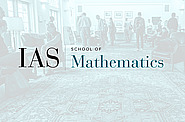2007-2008 seminars
Apr
29
2008
Apr
28
2008
Computer Science/Discrete Mathematics Seminar I
Security Under Key-Dependent Inputs
Shai Halevi
11:15am|S-101
Apr
15
2008
Computer Science/Discrete Mathematics Seminar II
Nearly Diagonally Dominant Matrices and Their Applications
10:30am|S-101
Apr
14
2008
Computer Science/Discrete Mathematics Seminar I
Embeddings of Discrete Groups and the Speed of Random Walks
11:15am|S-101
Apr
08
2008
Computer Science/Discrete Mathematics Seminar II
Spherical Cubes, or Coordinated Random Choices in High Dimensions
10:30am|S-101
Apr
07
2008
Computer Science/Discrete Mathematics Seminar I
Merkle Puzzles are Optimal
Mohammad Mohmoody Ghidary
11:15am|S-101
Apr
01
2008
Computer Science/Discrete Mathematics Seminar II
The Distribution of Polynomials Over Finite Fields
10:30am|S-101
Mar
31
2008
Computer Science/Discrete Mathematics Seminar I
On Proving Hardness of Improper Learning from Worst-Case Assumptions
Benny Applebaum
11:15am|S-101
